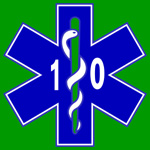|
|
MEDIC SOLO Disaster + Wilderness Medical School |
Wilderness First Responder Certification Course
Description ~ Designed for Whom? ~ Overview ~ Why THIS Instructor ~ Calendar ~ Certification ~ Topics
Description:
The WFR topics list is a comprehensive and
in-depth look at the standards and skills of dealing with: Response and
Assessment, Musculoskeletal Injuries, Environmental Emergencies and Survival
Skills, Soft Tissue Injuries, and Medical Emergencies. Although these appear to
be the same basic topics covered in the two-day
WFA course, they are covered far
more extensively including topics not covered in the WFA course,
Instructor Matt Rosefsky starts out each topic with a shared-learning
discussion on prevention, and there is much more hands-on practice.
Learning by doing is powerful. You will do, and hence learn, much more.
CPR certification is
offered as an optional evening-time add-on during the class for those who don't
have it or want a refresher. CPR certification is required for the WFR
certification to be valid.
Who is this Course Designed For?
Longer than the wilderness first aid (WFA) course, WFR is especially designed for:
- anyone caught in an urban disaster crisis
- camp counselors
- back country trip leaders
- mountain guides (backpacking, hiking, ice climbing, rock climbing, etc.)
- river guides (canoeing, kayaking, rafting)
- ski patrollers
- anyone wanting to delve deeply into how to give emergency care when 911 EMS service is down, overwhelmed, or out of cellphone range.
- For adults and focused youths ages 12+ with solid attention spans. Know your loved ones are safe wherever they are.
Overview:
- No prior first aid or CPR training necessary. No prerequisites.
- Hands-on learn how to care for an injured / ill person during the critical minutes or hours before ambulance / hospital hand-off
- Blend of classroom instruction & hands-on rescue scenario practice
- 3-year internationally-renowned SOLO WFR certification
- Testimonials
Why Choose THIS Instructor (Matt Rosefsky)?
- Here are all of the anonymous feedback surveys from several past WFR
courses Matt taught:
Even with great feedback, Matt forever continues to work hard to grow his knowledge and teaching skills, forever endeavoring to improve the course experience.
- Bonus: part of overall course enjoyment are course facilities and food (if you choose the meal plan):
Calendar & Registration:
- 2021 (sorry, 2020 is canceled): nine days
mid- to late-August, at the
beautiful
Spruce Knob Mountain Center,
near the highest mountain peak of West Virginia
- 100% of course proceeds go to Experience Learning, a 501(c)(3) nonprofit organization.
- Pricing and Registration are set and run by Experience Learning. For site-specific questions, please contact Experience Learning.
Certification & Recertification
- Certification: with this course, get the internationally-renowned 3-year WFR certification from SOLO, the oldest continuously-operating school of wilderness medicine in the world.
- Are you a healthcare provider needing continuing education credits? The WFR typically counts for credits, although it may depend on what type of provider you are. Inquire for details.
- Want a Wilderness EMT certification?
- Not an EMT, but want to become a Wilderness EMT? Within the first year of completing this WFR course, become EMT-certified locally and complete some paperwork to receive a WEMT certification card. Better yet, enroll in SOLO's WEMT Part II Module (the last two weeks of a WEMT course) to get your EMT instruction, blended with wilderness information, resulting in a WEMT certification (after you pass practical and written EMT exams). Inquire for details on either path.
- Already a street EMT? You can take the WFR course and become certified as Wilderness EMT; inquire for details.
- Recertification information
Topics:
| · Anatomy of a Backcountry Crisis | · Environmental Emergencies | · PAS in the Extreme Environment |
| · Abdominal Pain | · Epinephrine Use | · Poisoning |
| · Abdominal Trauma | · Fractures & Splinting Techniques | · Primary Survey: "The First Five Minutes" |
| · Allergic Reactions | · Group Preventative Medicine | · Prudent Heart Living |
| · Altitude-Related Injuries | · Head Trauma | · Role of the Wilderness First Responder |
| · Bites & Stings: Animals & Plants | · Heat-Related Injuries | · Secondary Survey & Vital Signs |
| · Bivouac Skills | · History Taking | · Shock & Bleeding Control |
| · Bloodborne Pathogens & Infectious Disease | · Improvising Litters | · Shortness of Breath |
| · Body Systems: Anatomy & Physiology | · Leadership of Backcountry Expeditions | · SOAPnote & Getting Help |
| · Burns | · Emergency Lifting & Moving Techniques | · Soft Tissue Injuries & Bandaging Skills |
| · Changes in Level of Consciousness | · Lightning-Related Injuries | · Spinal Cord Injury |
| · Chest Pain | · Long-Term Patient Care | · Spinal Cord Injury Management |
| · Chest Trauma | · Long-Term Management of the Shock Victim | · Splinting Practice |
| · Cold-Related Injuries | · Long-Term Wound Care | · Sprains & Strains |
| · Common Expedition Problems | · Medical Emergencies and Patient Assessment | · Wilderness Stabilization & Bivouac |
| · CPR Considerations in the Remote Environment | · Medicolegal Issues | · Wilderness versus Urban First Responder |
| · Diabetic Emergencies | · Mock Rescue | · Wilderness First Responder Practical Exam |
| · Dislocations & Reduction Techniques | · Organizing the Rescue | · Wilderness First Responder Written Exam |
| · Drowning-Related Injuries | · Patient Assessment System (PAS) |
.


